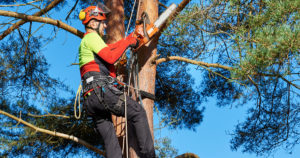Tree Care Dangers
April 2, 2020 Tree care workers face numerous job-related hazards, many of which can cause permanent and sometimes even deadly injuries. Luckily, employers can implement many helpful control methods and on-the-job solutions that to guard workers against recognizable hazards and preventable injuries.
Tree care workers face numerous job-related hazards, many of which can cause permanent and sometimes even deadly injuries. Luckily, employers can implement many helpful control methods and on-the-job solutions that to guard workers against recognizable hazards and preventable injuries.
Common on the Job Hazards
Tree service technicians care for trees by pruning, trimming, stabilizing broken branches, fertilizing, and diagnosing problems. The government employs some tree care workers, while others work for private firms like landscaping and lawn care companies. Tree care workers use a large variety of tools and equipment to complete tasks, many of which are extremely dangerous. According to the Occupational Safety and Health Administration (OSHA), some of the most common hazards that tree workers face are:
- Electrical hazards. Workers can be electrocuted when a branch, limb, uninsulated aerial lift, or a body part is exposed to a live electrical power line.
- Workers are vulnerable to being struck by moving vehicles in work zones.
- Chipper hazards. Wood chippers are machines used to reduce large pieces of wood into smaller woodchips. Workers can sustain injuries when material flies out of the chipper, striking them, as well as when they manually insert materials or lean too far into the machine.
- Aerial lifts. Aerial lifts can be hazardous in several different ways. Workers can be thrown from these elevated work platforms, and they are also prone to coming into contact with power lines and tipping over.
- Drop zones. Falling branches, trees, and tools can strike workers who are in the drop zone, or a designated area around a tree that is being pruned, trimmed, or cut down.
Safety Tips and Control Methods
According to federal labor data, 75% of all tree care fatalities are related to tree removal or tree trimming. Electrical contact, falls, and struck-by accidents are the most common type of incident that results in these preventable deaths. Luckily, OSHA provides employers with control methods so that they can reduce the risks associated with known tree care hazards.
Because they are legally obligated to provide safe and healthful workplaces, employers have to provide adequate health and safety training to every employee in a language that he or she is able to understand. Trainings should include a range of important topics, like how to inspect and use machinery, communicating effectively on the job, traffic controls, and more. Employers should also provide workers with PPE, or personal protective equipment. It is also important to inspect jobsites daily and that workers are taught how to identify and avoid job-related hazards. Implementing safety programs and practices are a few of the best ways that employers can do their part in protecting workers from serious and fatal injuries. When the neglect of an employer results in the worker being injured, the employer is liable for damages. In these instances, it is advisable for the injured worker to file what is known as a workers’ compensation claim. Workers’ compensation is a type of insurance that provides medical benefits and wage replacement to injured workers.
Negligent employers are not the only ones who may be responsible for a tree care worker’s injuries. Certain third parties, like the driver of a striking vehicle (also known as the at-fault driver) or the manufacturer of a defective wood chipper or aerial lift can also be found liable for disabling and deadly workplace injuries. If you were injured at work and would like to learn more about filing a claim or have another legal question, someone at our firm can help. Please contact us online.
Philadelphia Workers’ Compensation Lawyers at Galfand Berger, LLP Representing Injured Individuals Since 1947
Galfand Berger has offices located in Philadelphia, Bethlehem, Lancaster, and Reading, we serve clients throughout Pennsylvania and New Jersey. To schedule a consultation, call us at 800-222-8792 or complete our online contact form.
 Google Screened
Google Screened
